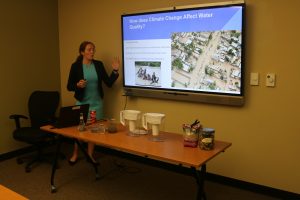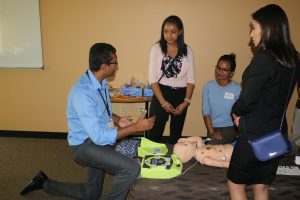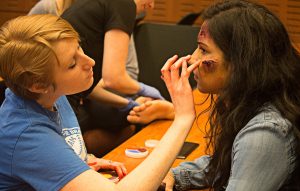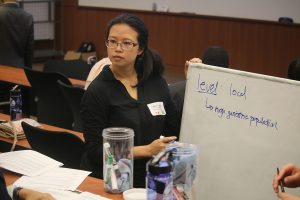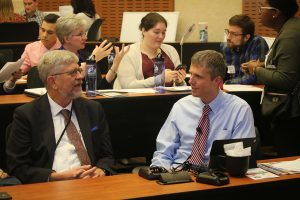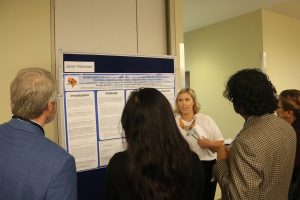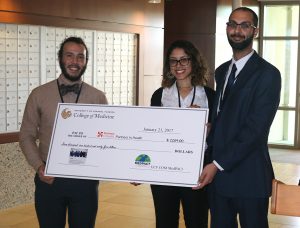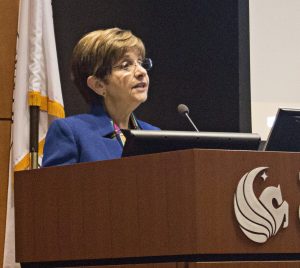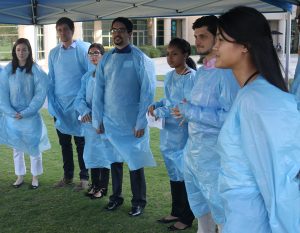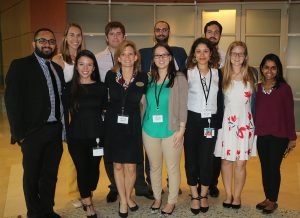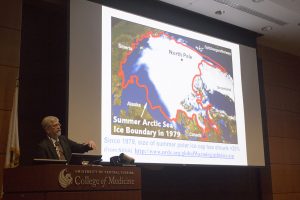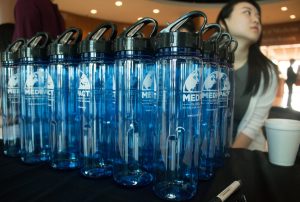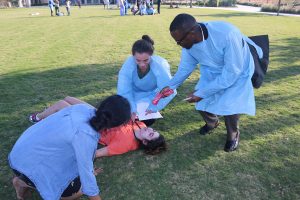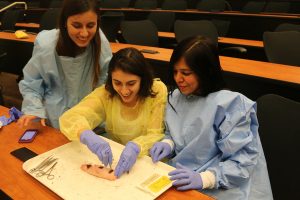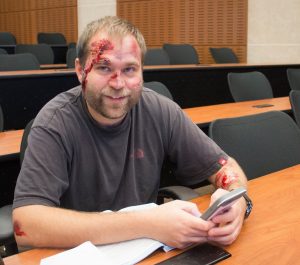- College of Medicine Global Health Students
More than 200 students and faculty attended the College of Medicine’s sixth-annual Global Health Conference January 21 , to learn how the health of the world’s most vulnerable populations can be affected by climate change.
This year’s conference recorded the highest number of attendees since its inception in 2011, a total of 214 participants, up from 151 last year. This is also the first year the conference has seen such a large number of students from other universities. Approximately 35 percent of attendees were students from outside UCF, including University of Miami, University of Louisville, University of Illinois and the University of Los Andes in Colombia.
The conference’s keynote speaker, Dr. Sten Vermund, vice president for global health at Vanderbilt University School of Medicine, outlined the impacts of climate change and urged participants to do their part in saving the planet.
“It is not that hard to think about lifestyle changes that everyone in this room can operationalize starting tomorrow,” Dr. Vermund said. “There are so many ways to reduce your personal carbon footprint and so many policies that can be operationalized to enable a wide swath of the population to reduce its carbon footprint.”
In his address, Dr. Vermund pointed to data that evidenced the changing global climate including rising temperatures over the years –- 2016 has been recorded as the hottest year on record — extreme weather conditions like Hurricane Sandy, and a rise in the spread of vector-borne diseases such as the West Nile, Zika and chikungunya viruses.
He also explored adverse effects climate change has on health including heat related deaths, loss of coastline and marine life, rising sea levels and species extinction.
Advocating for health issues at the national level is crucial to securing policy changes and so attendees received practical lessons in advocacy in an interactive workshop led by Porter Delaney, a lobbying and advocacy expert and founding partner of the Kyle House Group.
Attendees also gained hands-on experience in dealing with crises they might face in the field. During the second half
of the day, they learned how to respond to a mass casualty incident, save the life of a severely dehydrated child, perform biopsies, suture using pigs’ feet, deal with patients speaking another language and treat skin diseases.
A mass casualty incident required participants to act as first responders to triage a large group of patient actors suffering from life –threatening injuries, made real with graphic special effects make-up. They learned to perform rehydration techniques such as administering intravenous and intraosseous (within the bone) fluids on a severely dehydrated child – a medical mannequin. They were also challenged to treat patients from different continents who spoke foreign languages – relying on mobile phone apps to translate.
The conference is organized each year by MedPACt (Medical Students Providing Across Continents) a UCF student organization dedicated to promoting awareness and participation in improving the health needs of people throughout the world.
“We’ve had great collaboration and networking with professionals in the industry at this event,” said Michael Mankbadi, second-year UCF medical student and conference director. “And we’ve built relationships that will allow us to strengthen global health endeavors in the U.S. as well as build collaborative efforts to tackle climate change.”
Dr. Judy Simms-Cendan, College of Medicine associate professor, director of international experiences and MedPACt faculty advisor, said the successful conference showed the hard work of dedicated students and the value and importance of global health education.
“We received wonderful feedback from our keynote speaker and the students from all different backgrounds from engineering to nursing, to public health to medical students, from all over the states,” she noted. “They all felt that the combination of simulations, advocacy workshops and our keynote really made for a rich conference experience.”
The conference organizers presented a check of $2,200 to Partners in Health to assist with relief efforts for victims in Haiti, a country still recovering from a series of natural disasters that have been attributed to climate change.
“Climate change is a very important issue,” said Thuymi Nguyen, a pre-med student at Florida Atlantic University. “It’s not just important to know about it or to talk about it, but also to implement it, to advocate and to take action. The workshops were really interactive and I enjoyed it. The campus is really gorgeous and I can’t wait to come back next year!”
